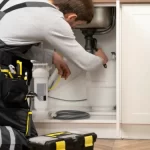Ensuring bathroom safety is essential for all ages. To avoid falls, provide non-slip mats. For extra assistance, place grab bars next to the shower and toilet. To prevent shocks, keep electrical gadgets away from water sources. Adequate lighting, especially at night, reduces accidents, while keeping floors dry and clearing clutter helps maintain a safe environment.
Introduction
Bathrooms, though essential, can be surprisingly treacherous. With slippery surfaces and fixtures that can be difficult to navigate, it’s no surprise that many home accidents occur here. By implementing a few bath safety measures, you can create a much safer environment for yourself, your family, and any guests who visit your home. These measures can prevent potential injuries, provide peace of mind, and promote a sense of security for all household members.
This guide offers practical tips to improve bathroom safety, including preventing slips and incorporating innovative technology. It is appropriate for bathroom redesigns or necessary features without requiring significant reconstruction since it can be adjusted to match any size and budget.
Understanding Common Bathroom Hazards
Bathrooms are notorious for being the most dangerous room in a home, mainly because the abundance of water creates slippery surfaces, increasing the risk of accidents and bathroom hazards. According to the CDC, thousands of people are injured in bathroom-related incidents every year. Falls are the most common type of accident, underscoring the need for proactive safety measures. It’s crucial to be aware of these risks to correct them swiftly. Floors can become wet from showers and baths and even splash from sinks, leading to dangerous falls, especially for children and older people. Moreover, electrical outlets close to water sources present risks of electric shock.
Strategies for Preventing Slips and Falls
One of the simplest methods to lessen the danger of slipping in the shower or bathtub is to use non-slip mats or strips. These inexpensive tools provide grip, even when wet. Installing handrails offers additional support, which is especially beneficial for older adults. Well-placed handrails can prevent falls by providing something to hold onto if balance is lost. Furthermore, maintaining a dry and clutter-free floor will significantly reduce fall risks. Take every opportunity to mop up spills and water after use, and keep the bathroom free from excess items that could cause trips and falls.
Simple Modifications for Enhanced Safety
Adding grab bars near toilets and showers enhances security by providing stable support. Lowering water temperature to prevent scalding is crucial. Accessible storage solutions make frequently used items readily accessible, reducing risky maneuvers on wet surfaces. These modifications prevent accidents and make daily routines more comfortable and convenient, promoting independence for those with mobility challenges.
Childproofing the Bathroom
Bathrooms can be a dangerous place for children. Therefore, it’s important to store medications and cleaning supplies out of reach securely. Consider using locks or child-resistant caps on such items. Installing toilet locks can prevent children from accessing the toilet unsupervised, reducing potential hazards. Additionally, always supervise young children in the bathroom and educate them early about water safety to instill good habits.
Taking Care of Elderly and People with Mobility Impairments
Shower chairs and raised toilet seats benefit seniors and those with mobility challenges, offering stability and ease. They reduce fatigue and risk during bathing while raising toilet seats minimizes strain and falls. To increase accessibility, consider integrating remote-operated devices for adjustable settings. These changes empower individuals to maintain independence, ensure safety, and promote dignity in bathroom routines.
The Importance of Regular Bathroom Maintenance
Regular maintenance checks are essential to ensure long-term safety. Examine plumbing and electrical systems annually to catch defects early, such as leaks or fraying wires. Repair any loose tiles or fixtures promptly to prevent trips or falls. Although maintaining your bathroom may seem like a chore, it serves as a safeguard to maintain its integrity and stop little problems from becoming more extensive, more expensive safety hazards.
Smart Bathroom Gadgets for Safety and Convenience
With the advent of technology, intelligent bathroom gadgets can offer both safety and convenience. Motion sensor lights and voice-activated controls reduce the need to fumble for switches in the dark, making the bathroom safer at night. Evaluate options such as intelligent showers and faucets to see how these innovations could enhance your bathroom space, providing easy access and minimizing the risk of scalding by allowing custom temperature settings.
Read this comprehensive guide from CNET for more in-depth insights on smart home innovations.
Promoting a Home Safety Culture in the Bathroom
Ensure that everyone in the house is aware of any possible risks in the restroom. Implement a bathroom safety checklist to review and update safety measures regularly. This practice ensures that everyone contributes to a safer environment. Familiarizing everyone with safety procedures can drastically reduce the odds of an accident, reinforcing a culture of awareness and prevention as part of daily living.
Learn more about home accident prevention through this informative article from Safety+Health Magazine.















